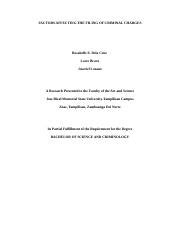What Factors Affect the Time to File Charges?
The time it takes for charges to be filed in a criminal case varies greatly depending on a complex interplay of factors. There's no single, simple answer, as each case possesses its unique circumstances. Understanding these influencing factors, however, can provide a clearer picture of the process and expectations involved. This article explores the key elements that impact the timeline from investigation to the formal filing of charges.
The Complexity of the Investigation:
This is arguably the most significant factor. Simple cases involving readily available evidence, like a straightforward shoplifting incident with clear video footage, may see charges filed relatively quickly. However, complex investigations, such as homicides, rapes, or large-scale fraud, necessitate extensive forensic analysis, witness interviews, and potentially, cross-jurisdictional cooperation. This meticulous process inherently extends the timeline. The more extensive the investigation required, the longer it will take to compile enough evidence to support a prosecution.
Availability of Evidence:
The accessibility and quality of evidence are critical. If crucial evidence is missing, lost, or requires further examination (e.g., DNA testing, digital forensics), the investigation will inevitably be delayed. The time taken for forensic analysis, particularly in cases involving sophisticated technology, can stretch the timeline considerably. Furthermore, the strength of the evidence directly impacts the prosecutor's decision to file charges. Weak or insufficient evidence may lead to delays while seeking additional information or even to the case being dropped entirely.
Number of Suspects:
Multiple suspects complicate matters, requiring investigators to sift through more information and track down more individuals. The need to coordinate investigations involving several suspects inherently increases the time needed to build a solid case against each one. Furthermore, if suspects are located in different jurisdictions, inter-agency cooperation is necessary, adding to the overall timeframe.
Cooperation of Witnesses:
Witness cooperation is paramount. Uncooperative or reluctant witnesses can significantly delay the process. Securing witness statements may require multiple attempts, subpoenas, and even the need to address witness protection concerns. Additionally, inconsistencies or contradictions in witness accounts necessitate further investigation, thereby extending the timeline.
Prosecutorial Resources and Caseload:
Prosecutors have limited resources and handle a substantial caseload. Prioritizing cases based on severity, evidence strength, and available resources inevitably influences the order in which charges are filed. High-profile cases or those requiring extensive legal preparation might take precedence over less complex ones, leading to delays in the latter.
Jurisdictional Issues:
The jurisdiction where the crime occurred plays a role. Cases involving multiple jurisdictions or international elements inherently require more complex legal processes and coordination, significantly lengthening the time before charges are filed. Extradition processes, legal reciprocity between countries, and language barriers can contribute to delays.
Defendant's Rights:
While not directly affecting the time to file charges, the defendant's rights must be scrupulously followed throughout the process. Respecting these rights, including the right to counsel and to remain silent, can sometimes influence the speed of investigations. The time required to ensure procedural fairness adds to the overall legal timeline.
How Long Does it Typically Take?
There is no set timeframe. Simple cases might see charges filed within days or weeks, while complex ones can take months or even years. The factors outlined above interact in various ways, resulting in a wide range of timelines.
This exploration offers a nuanced understanding of the diverse elements affecting the length of time before charges are filed in a criminal case. It highlights the intricacies and complexities inherent in the legal process, emphasizing that patience and understanding are often required.

